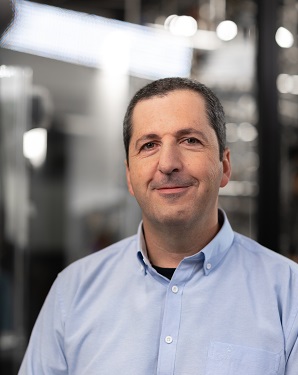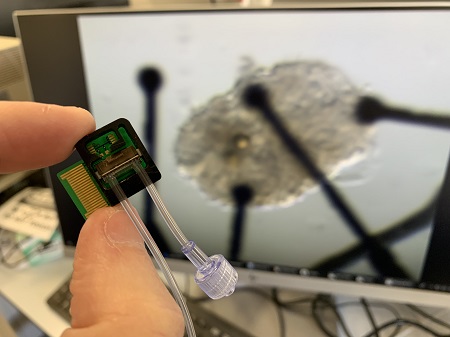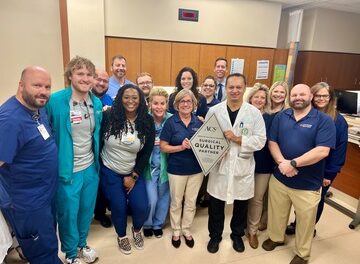Heart with Sensors
JERUSALEM, August 9, 2023 – A team of researchers, led by the Hebrew University of Jerusalem (HU), has developed a tiny human heart model that could potentially transform cardiovascular research and animal-free drug testing.
Cardiovascular diseases remain the leading cause of global mortality, underscoring the critical importance of this pioneering development. The study, published in Nature Biomedical Engineering, introduces a self-paced, multi-chambered human heart model, approximately half the size of a rice grain.

Prof. Yaakov “Koby” Nahmias
“Integrating our complex human heart model with sensors allowed us to monitor critical physiological parameters in real-time, revealing intricate mitochondrial dynamics that drive cardiac rhythms,” said Prof. Yaakov “Koby” Nahmias, Director of the Hebrew University Alexander Grass Center for Bioengineering, and a Fellow of the American Institute for Medical and Biological Engineering (AIMBE). “This is a new chapter in human physiology.”
Prof. Nahmias and his team created a highly accurate replica of a heart using human induced pluripotent stem cells (hiPSCs), which are derived from adult, non-reproductive cells that have been genetically reprogrammed. The tiny model has multiple chambers, pacemaker clusters, epicardial membrane, and endocardial lining, with all features meticulously designed to mimic a human heart’s structure and functionality.
The heart model detected a new form of cardiac arrhythmia, distinct from those observed in traditional animal models, which will enable researchers to gain invaluable insights into the precise effects of pharmaceutical compounds on the human heart.
One of the most significant features is the new model heart’s ability to provide real-time measurements of essential parameters such as oxygen consumption, extracellular field potential, and cardiac contraction. This capability enabled the scientists to gain unprecedented insights into heart function and diseases that could significantly advance the cardiovascular research field.
In the study, the researchers tested the heart model’s response to the chemotherapeutic drug mitoxantrone, commonly used to treat leukemia and multiple sclerosis. Through these experiments, the researchers pinpointed how mitoxantrone induces arrhythmia by disrupting the heart’s electro-mitochondrial coupling. The team also discovered a potential solution by administering metformin, which showed promise for mitigating the drug’s adverse effects.
Partnering with Tissue Dynamics Ltd, a biotechnology company founded at Hebrew University by Prof. Nahmias, the scientists have developed a robotic system that can screen 20,000 tiny human hearts in parallel for drug discovery applications. This micro-physiological system has vast potential applications and is likely to accelerate the discovery of safer and more effective pharmaceutical interventions.
With this tiny heart model, pharmaceutical companies could make significant strides in developing safer, and more effective, medications for patients worldwide, improving patient outcomes and potentially saving lives.
“This miniature human heart model has the potential to reshape drug testing practices, advance our understanding of cardiovascular diseases, and ultimately contribute to a healthier and more sustainable future,” said the researchers.
Funding was provided by the European Research Council Consolidator Grant OCLD (project no. 681870) and generous gifts from the Nikoh Foundation and the Sam and Rina Frankel Foundation. Hebrew University researcher Mohammad Ghosheh was supported by a Neubauer Foundation Graduate Fellowship.
About the Hebrew University of Jerusalem
The Hebrew University of Jerusalem is Israel’s premier academic and research institution. Serving over 23,000 students from 80 countries, the university produces nearly 40% of Israel’s civilian scientific research and has received over 11,000 patents. Faculty and alumni of the Hebrew University have won eight Nobel Prizes and a Fields Medal. For more information about the Hebrew University, please visit http://new.huji.ac.il/en.
About American Friends of the Hebrew University
American Friends of the Hebrew University (AFHU) is a national, not-for-profit organization based in the United States. AFHU is headquartered in New York and has seven regional offices working in close partnership with the Hebrew University of Jerusalem. AFHU provides supporters, Hebrew University alumni, and the public with stimulating programs and events and organizes missions to Israel. The organization’s fundraising activities support scholarly and scientific achievement at the Hebrew University, create scholarships, construct new facilities, and assist the university’s efforts to attract and retain outstanding faculty.
For more information, please visit http://www.afhu.org/.




























